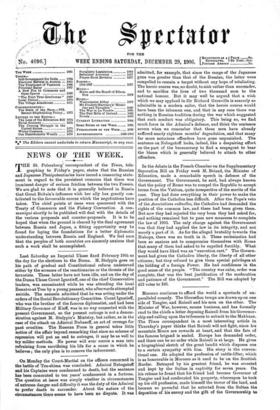On Monday the Court-Martial on the officers concerned in the
battle of Tsu-shima was concluded. Admiral Nebogatoff and his Captains were condemned to death, but the sentence has been commuted to ten years' confinement in a fortress. The question at issue was simply whether in circumstances of extreme danger and difficulty it was the duty of the Admiral to prefer death to surrender. About the nature of the circumstances. there seems to have been no dispute. It was admitted, for example, that since the range of the Japanese guns was greater than that of the Russian, the latter were compelled to remain a target without any hope of retaliating. The heroic course was, no doubt, to sink rather than surrender, and to sacrifice the lives of two thousand men to the national honour. But it may well be argued that a wish which we may applaud in Sir Richard Grenville is scarcely so admirable in a modern sailor, that the heroic course would have been the inhuman one, and that in any case there was nothing in Russian tradition during the war which suggested that such conduct was obligatory. This being so, we find much force in the Admiral's defence, and think the sentence severe when we remember that these men have already suffered nearly eighteen months' degradation, and that many far more notorious offenders have gone unpunished. The sentence on Nebogatoff looks, indeed, like a despairing effort on the part of the bureaucracy to find a scapegoat to bear the blame which is generally believed to attach to other offenders.


































